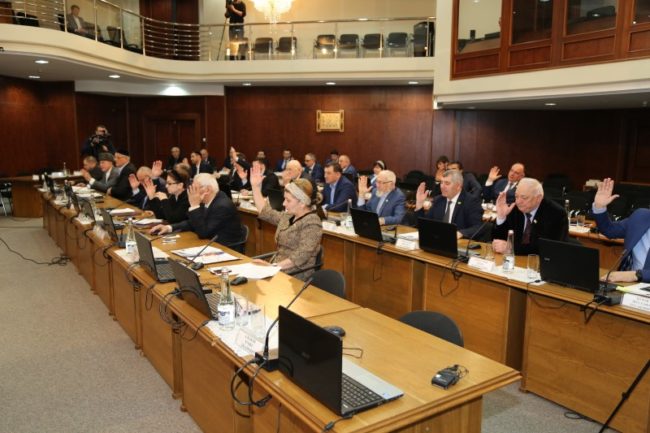

 The Parliament of Ingushetia has adopted a law prohibiting the glorification of Joseph Stalin in the republic, which includes erecting his monuments or busts, naming streets and institutions after him, and other actions aimed at commemorating the late Soviet leader.
The Parliament of Ingushetia has adopted a law prohibiting the glorification of Joseph Stalin in the republic, which includes erecting his monuments or busts, naming streets and institutions after him, and other actions aimed at commemorating the late Soviet leader.
The bill was passed unanimously on its first reading on 22 February, on the eve of the 73rd anniversary of the deportation of the Ingush people. The Parliament’s press service reports that MPs read a prayer in memory of the victims of the 1944 deportation before the vote.
The bill was prepared by a group of MPs, whose explanatory memorandum lists numerous archival documents proving that repression occurred under Joseph Stalin’s direct order and under his direct supervision.
Commenting on the bill, the chairman of the People’s Assembly of Ingushetia, Zelimkhan Yevloyev, said that Stalin left a ‘trail of blood’ in the history of the Ingush people, and that they remembered the events of 1944.
‘Both intellectuals and ordinary workers were subject to repressions. Everyone suffered a strong blow, including different religious denominations’, Yevloyev said.
Yevloyev said that the Ingush people do not glorify Stalin, as he is remembered as a tyrant, who caused suffering to peoples across the Russian Federation.
The twenty-third of February 2017 marks the 73rd anniversary of the mass deportation of the Chechen and Ingush peoples. On that day, over 91,000 Ingush were forcibly removed to Central Asia. The entire nation was deported on false charges of ‘state treason’. Nearly half of the population died on the journey or while in exile from hunger, cold, and disease. The deportation has been recognised by many, including the European Parliament as genocide.
In recent years, a campaign to glorify Joseph Stalin has been launched by nationalist groups in Russia. Hundreds of monuments and busts have been erected throughout the country. This includes the North Caucasus, for example in Krasnodar Krai, Stavropol Krai, and Daghestan. The Russian authorities have encouraged the efforts of nationalist groups to rehabilitate Stalin.









